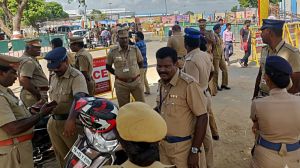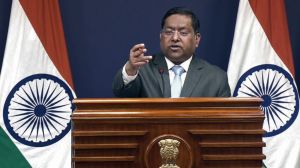Looking glass
Looking back with M.N. SrinivasIt is customary, as a year ends, to look back at the months gone by, to recount events that transpired with...

Looking back with M.N. Srinivas
It is customary, as a year ends, to look back at the months gone by, to recount events that transpired within that time and reflect on their implications. When one is approaching a date as significant as the one around the corner, one needs to look back even further perhaps : a century at least, if not a millennium. It is a daunting proposition and one that I had no intention of pursuing even halfway. Until I ch-anced upon an essay on the changing values in India since independence written in 1992 by M.N. Srinivas. As readers are pr-obably aware, M. N. Srinivas, one of In-dia8217;s foremost social scientists, passed away recently. Publications have been flush with obituaries praising his accomplishments. His field-worked monogra-phs, his observations on caste and his various conceptualisations including the idea of Sanskritisation8217; are remarked upon as having given him renown both at home and abroad. In fact, it is said, that contemporary sociology and anthropology inIndia began with M. N. Srinivas.
I met him in 1994 to interview him for a book I was writing on the impact of television and the middle-class. Far from an internationally renowned academic, I found a doughty middle aged man, unkempt and dressed in comfortable home clothes. He looked like any ordinary person spending his days in secluded retirement in Bang-alore. Once he warmed to his subject tho-ugh, he was unstoppable making trenchant observations on drawing rooms that have your wife8217;s wretched needlework on the wall8217; and on the burgeoning Non-Resident Indian culture : people recounting their visits to relatives abroad; mothers travelling to supervise their daughters8217; pr-egnancies. The NRI was going to be a Trojan ho-rse for western values8217; he darkly warned. Be-fore I left, he gave me a copy of his essay. It was his only copy, he told me. Please xerox it and send it back, he said. I am pleased to say I did not forget. And as one of India8217;s few truly public intellectual figures8217;, I think his views forman apt summation for the century-end of social trends in post independence India.
In the early part of the essay, Srinivas describes the aim set out in the Constitu-tion : to create a casteless and classless8217; society through parliamentary democracy based on adult franchise. quot;Democracyquot;, Srinivas maintained, quot;enables every tension to surface and with increasing numbers of hereditary groups competing to obtain access to resources which are getting more scarce, government is continually under such pressure that its survival occasionally appears precarious.quot; Despite this threat 8211; amply borne out by our recent series of short-lived governments Srinivas considered democracy as having played a crucial role in India: serving as an invaluable information system, sustaining the nation as a single entity and eliminati-ng famine.
In the next part he discusses the rise of corruption and violence. In both cases, he points out, it is not just a rise in fact but also in mythology, an example being the casual mannerin which people discuss ministers making huge sums of money. Also the tacit acceptance of violence and the growing insensitivity to murder, bloodshed, gang wars and rape. Coming next to the middle class he finds there has been a visible improvement in the living standards of large numbers of people. The accompanying desire to improve social sta-nding and hence the significance of education coupled with various other factors had however, he admits ruefully, produced a stream of educated misfits8217;. The old problem of brain drain, on the other hand, he discovered, was no longer perceived as a negative with expatriates8217; becoming NRIs8217; and their greenbacks being preferred to their grey cells.
The surge in consumerism and advertising, he worried, would greatly increase the rich and poor divide while stress would drive all classes to astrology and other palliatives. Teenagers come in for a special mention with Srinivas claiming that their distinct culture needs to be studied by sociologists andanthropologists quot;in the same way as they study the culture and behaviour of faraway tribes and ethnic groups.quot;
In the realm of politics, the major ch-ange he identifies as having occurred with independence and adult franchise is the emergence of political power as the su-preme value. Artha, he maintains, has co-me loose from dharma. And within artha power has emerged as superior to wealth for power can confer wealth and much else besides. Power has not only become glamorous but also emerged as the legitimiser of all acheivement. Evidence of which can be found in ministers being asked to inaugurate, release, preside over and grace functions.
There are prescriptions as well. The eminent sociologist believed that : quot;peop-le8217;s movements are needed particularly to teach elected representatives that real po-wer in a democracy vests with the people and that errant, corrupt or perverse gover-nments will not be tolerated.quot; And, on the individual plane, he felt quot;there is a need to spread the message that happinessconsists not in the senseless accumulation of goods which one can do without but in doing work which not only gives money but satisfaction. It is also necessary to realise that those who are gifted have an obligation to use th-eir gifts which they have inherited and wh-ich a favourable environment in the early years developed, for the good of society, for the benefit of those who are weaker, and not for self-aggrandisement and self-glorification. Gandhi8217;s idea of trusteeship sh-ould not be confined to the wealthy but extended to include the gifted.quot;
- 01
- 02
- 03
- 04
- 05































